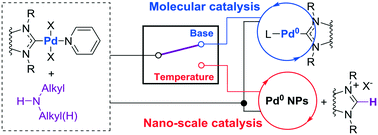当前位置:
X-MOL 学术
›
Catal. Sci. Technol.
›
论文详情
Our official English website, www.x-mol.net, welcomes your feedback! (Note: you will need to create a separate account there.)
Preventing Pd–NHC bond cleavage and switching from nano-scale to molecular catalytic systems: amines and temperature as catalyst activators
Catalysis Science & Technology ( IF 5 ) Pub Date : 2019/12/04 , DOI: 10.1039/c9cy02041a Oleg V. Khazipov 1, 2, 3, 4, 5 , Maxim A. Shevchenko 1, 2, 3, 4, 5 , Dmitry V. Pasyukov 1, 2, 3 , Andrey Yu. Chernenko 1, 2, 3 , Alexander V. Astakhov 1, 2, 3, 4, 5 , Victor A. Tafeenko 6, 7, 8 , Victor M. Chernyshev 1, 2, 3, 4, 5 , Valentine P. Ananikov 1, 2, 3, 6, 7
Catalysis Science & Technology ( IF 5 ) Pub Date : 2019/12/04 , DOI: 10.1039/c9cy02041a Oleg V. Khazipov 1, 2, 3, 4, 5 , Maxim A. Shevchenko 1, 2, 3, 4, 5 , Dmitry V. Pasyukov 1, 2, 3 , Andrey Yu. Chernenko 1, 2, 3 , Alexander V. Astakhov 1, 2, 3, 4, 5 , Victor A. Tafeenko 6, 7, 8 , Victor M. Chernyshev 1, 2, 3, 4, 5 , Valentine P. Ananikov 1, 2, 3, 6, 7
Affiliation

|
Many reactions catalyzed by Pd complexes with N-heterocyclic carbene (NHC) ligands are performed in the presence of amines which usually act as coupling reagents or mild bases. However, amines can react with Pd/NHC complexes in a number of ways: enhancing molecular catalysis, causing the catalyst deactivation or triggering the ligandless modes of catalysis by producing NHC-free active palladium species. This study gains insight into conditions required for the efficient use of amines as activators of molecular Pd/NHC catalysis and preventing the undesirable reductive cleavage of the Pd–NHC bond in catalytic systems. Reactions of Pd/NHC complexes with various amines within a temperature range of 25–140 °C and thermal stability of the resulting amino-complexes are examined. The results indicate the major influence of the amine structure and reaction temperature on the catalyst transformation. In particular, thermal decomposition of Pd/NHC complexes with aliphatic amine ligands predominantly leads to reductive Pd–NHC bond cleavage, while deprotonation of the complexes with primary and secondary aliphatic amine ligands in the presence of strong bases at 25–60 °C promotes the activation of molecular Pd/NHC catalysis. Efficient Pd–PEPPSI complex–amine systems suitable for strong-base-promoted C–S cross-coupling reactions between aryl halides and thiols are suggested on the basis of these findings.
中文翻译:

防止Pd–NHC键断裂并从纳米级转换为分子催化系统:胺和温度作为催化剂活化剂
Pd配合物与N-杂环卡宾(NHC)配体催化的许多反应都是在通常存在偶合剂或弱碱的胺存在下进行的。但是,胺可以通过多种方式与Pd / NHC配合物反应:通过产生不含NHC的活性钯物质,增强分子催化作用,引起催化剂失活或触发无配体催化方式。这项研究深入了解了有效使用胺作为分子Pd / NHC催化活化剂和防止催化体系中Pd-NHC键发生不希望的还原裂解所需的条件。在25–140°C的温度范围内,检测了Pd / NHC配合物与各种胺的反应以及所得氨基配合物的热稳定性。结果表明胺结构和反应温度对催化剂转化的主要影响。特别是,Pd / NHC配合物与脂肪族胺配体的热分解主要导致还原性Pd-NHC键裂解,而在强碱存在下,在25-60°C下,具有伯和仲脂肪族胺配体的配合物的去质子化促进了激活分子Pd / NHC催化。在这些发现的基础上,提出了适用于强碱促进的芳基卤化物和硫醇之间的CS交叉偶联反应的高效Pd-PEPPSI复合物-胺体系。在25-60°C的强碱存在下,带有伯和仲脂族胺配体的配合物去质子化可促进分子Pd / NHC催化的活化。在这些发现的基础上,提出了适用于强碱促进的芳基卤化物和硫醇之间的CS交叉偶联反应的高效Pd-PEPPSI复合物-胺体系。在25-60°C的强碱存在下,带有伯和仲脂族胺配体的配合物去质子化可促进分子Pd / NHC催化的活化。在这些发现的基础上,提出了适用于强碱促进的芳基卤化物和硫醇之间的CS交叉偶联反应的高效Pd-PEPPSI复合物-胺体系。
更新日期:2020-03-09
中文翻译:

防止Pd–NHC键断裂并从纳米级转换为分子催化系统:胺和温度作为催化剂活化剂
Pd配合物与N-杂环卡宾(NHC)配体催化的许多反应都是在通常存在偶合剂或弱碱的胺存在下进行的。但是,胺可以通过多种方式与Pd / NHC配合物反应:通过产生不含NHC的活性钯物质,增强分子催化作用,引起催化剂失活或触发无配体催化方式。这项研究深入了解了有效使用胺作为分子Pd / NHC催化活化剂和防止催化体系中Pd-NHC键发生不希望的还原裂解所需的条件。在25–140°C的温度范围内,检测了Pd / NHC配合物与各种胺的反应以及所得氨基配合物的热稳定性。结果表明胺结构和反应温度对催化剂转化的主要影响。特别是,Pd / NHC配合物与脂肪族胺配体的热分解主要导致还原性Pd-NHC键裂解,而在强碱存在下,在25-60°C下,具有伯和仲脂肪族胺配体的配合物的去质子化促进了激活分子Pd / NHC催化。在这些发现的基础上,提出了适用于强碱促进的芳基卤化物和硫醇之间的CS交叉偶联反应的高效Pd-PEPPSI复合物-胺体系。在25-60°C的强碱存在下,带有伯和仲脂族胺配体的配合物去质子化可促进分子Pd / NHC催化的活化。在这些发现的基础上,提出了适用于强碱促进的芳基卤化物和硫醇之间的CS交叉偶联反应的高效Pd-PEPPSI复合物-胺体系。在25-60°C的强碱存在下,带有伯和仲脂族胺配体的配合物去质子化可促进分子Pd / NHC催化的活化。在这些发现的基础上,提出了适用于强碱促进的芳基卤化物和硫醇之间的CS交叉偶联反应的高效Pd-PEPPSI复合物-胺体系。



























 京公网安备 11010802027423号
京公网安备 11010802027423号